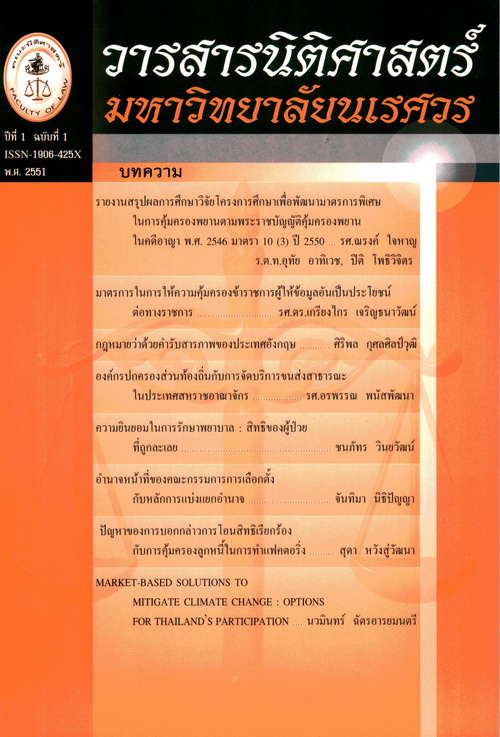Market-based solutions to mitigate climate : options for Thailand's participation
Main Article Content
บทคัดย่อ
Climate change is an emerging problem. One possible cause of climate change is increasing Greenhouse Gases (GHG) in the atmosphere. However, scientists continue to disagree whether anthropogenic or natural forces are the culprit. Without waiting for a final conclusion from scientists, under the principles of international law, the majority of countries in the world have agreed to take measures to stabilize the concentrations of GHG currently in the atmosphere in order to deter hazardous anthropogenic interference with the climate. In doing so, many countries are parties to the United Nations Framework Convention on Climate Change (บNFCCC) and its protocol - the Kyoto Protocol - which establish a framework and action plan to address the issue of climate change.
Thailand is a party to the UNFCCC and Kyoto Protocol, and may not yet be required to meet Kyoto Protocol emission limits under the common but differentiated responsibilities principle. However, the post-Kyoto protocol negotiation round has started to create and implement a plan to address climate change after the year 2012. In order to prepare to implement the results of the post-Kyoto protocol negotiations, Thailand should prepare to ensure the reduction of GHG. Among other measures, a market-based solution is an efficient tool to mitigate climate change, in addition to a cap-and-trade program, which is prevalent among many countries. Aside from leading to a reduction in GHG, a market-based solution will ensure energy efficiency and the development of technology. Therefore, Thailand should learn from and compare emission trading experiences from different emission trading systems and other countries. Engaging in such a study will permit the design of Thailancis emission trading system. Furthermore, the cap-and-trade program can assist in addressing the issue of climate change at the regional level, such as through ASEAN.
Emission trading will create major policy, economic, environmental, and legislative challenges. Therefore, Thailand must develop a formal legal structure for emissions trading that combines legal, economic, scientific, commercial, and environmental principles. It is clear that Thailand and its legal system are facing an exciting challenge and a new era.


